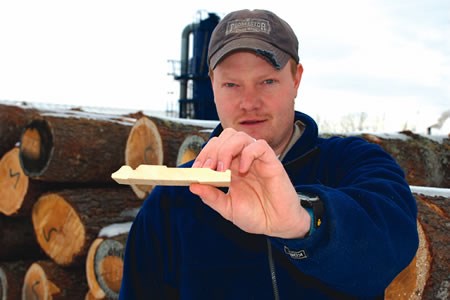It's been a work in progress, but John Hockenhull sees a future in the value-added forest products business.
The co-founder of Precision Wood Design is taking advantage of a local niche in the area's cottage building activity by producing flooring, panels and half-log siding for camps.
His four-employee company is one of the small producers working with Lakehead University wood researcher Mat Leitch.
Leitch and his graduate students work with large and small companies in performing mechanical lab testing for products, providing market assurance numbers and helping them with new products through research funding dollars.
Hockenhull says it's been a great benefit to work with Lakehead in finding these product niches.
"The research has to be done. That's probably the best place for the government to put their money. It's done fairly well and the research is public knowledge."
Hockenhull came to the sawmilling industry with a finance degree from the University of Lethbridge and a restaurant background from his family's Prospector Steak House in Thunder Bay.
Now located in an industrial park near Murillo, west of Thunder Bay, his five-year-old small business has evolved to do more customized work.
Together with business partner, Steven Brindley, they joined forces with a former local sawmill competitor, Howie Saw and added a Wood Miser distributorship to their overall offerings.
Hockenhull says there's an opportunity to grow local value-added manufacturing if more small producers network to collectively provide a wider range of products.
"There needs to be more of the same kind of companies working together, supplying each other with different components.
"Now it's just not there. The government says value-added wood is the way to go, but there's got to be a cluster there."
Hockenhull says it would be nice to have the option of cutting in Crown plots.
"The way the market is now, with mill shutdowns, there's not a whole lot of companies cutting in the bush. What's available is heading to the chipper."
Growing the business, especially in the cottage market in Minnesota and Wisconsin, is limited.
Ottawa's new softwood lumber agreement with the U.S. severely hampers small producers looking to break into the Midwestern states.
The Ontario quota in the deal applies only to those big companies already exporting. "It doesn't open up any new activity," says Hockenhull.
Restrictions allow him to export only a one-foot marked sample. A customer can order and pick up product, if it's valued under $1,000.
"If you weren't distributing anything across the border before, there's no quota available in the future. It's not an option for anything across the border as far as softwoods."
Hardwood products are fine, but Northern Ontario has limited desirable fibre.
Poplar and birch are considered low grade in the U.S. and sells at a discount. And black ash is not considered a premium wood.
Lakehead's Leitch has long been advocating development of forest products using underutilized native species such as black ash, tamarack, birch and poplar.
Some of his wood industry research can be further enhanced if he is successful in introducing a wood science major into Lakehead's forestry program.
This specialization would offer both the practical and theoretical side of wood science side of the industry, examining the properties of wood rather than the management of the forest or general pulp, paper and lumber.
"It would offer a more in-depth knowledge of wood and what can be done with it," says Leitch.
There would be additional courses in civil and chemical engineering, entrepreneurship and economics.
He's prepared a course outline and will be talking about it with faculty this summer.
In June, Northern Ontario Heritage Fund contributed $26,700 to Precision Wood to assist the company in the purchase and installation of equipment to burn wood waste fibre to the shop and a kiln instead of using natural gas.




